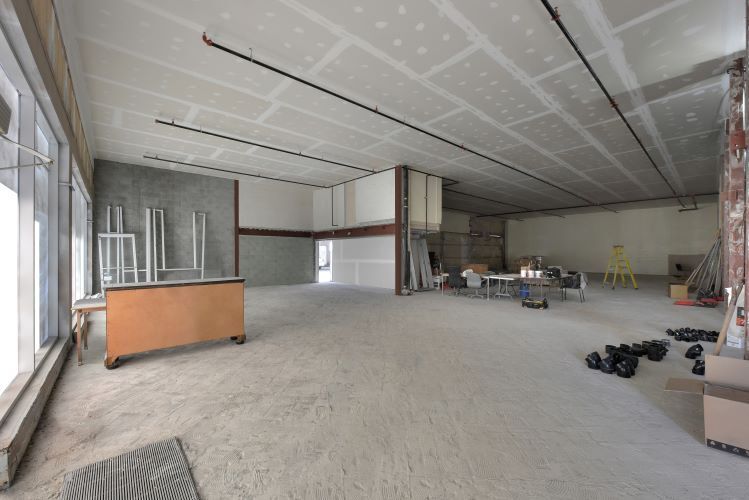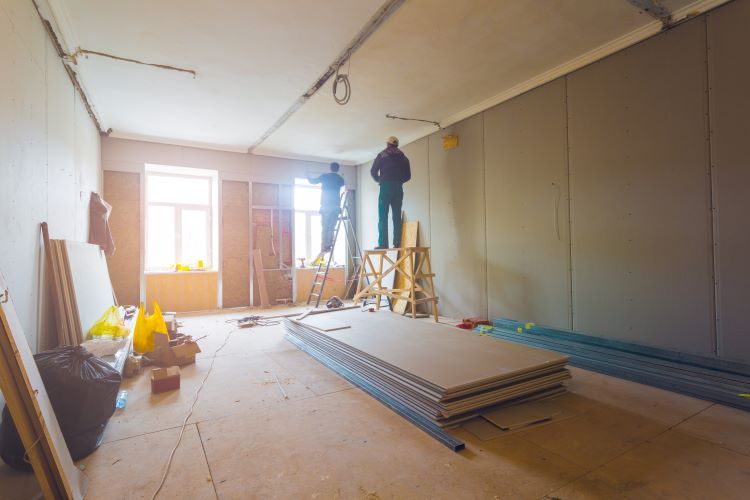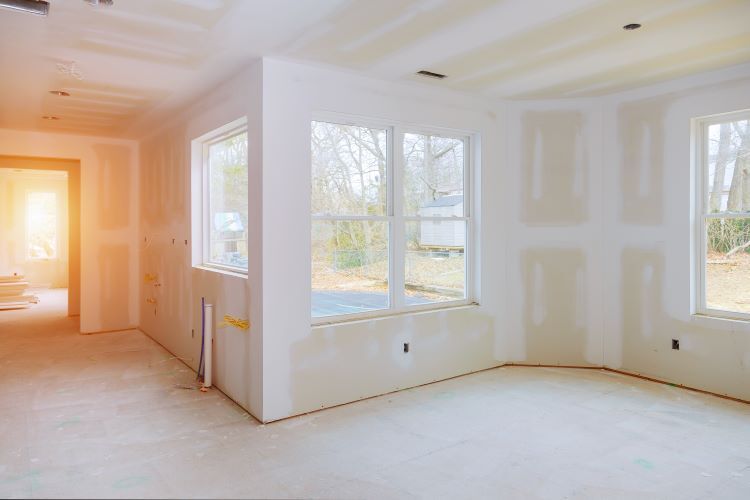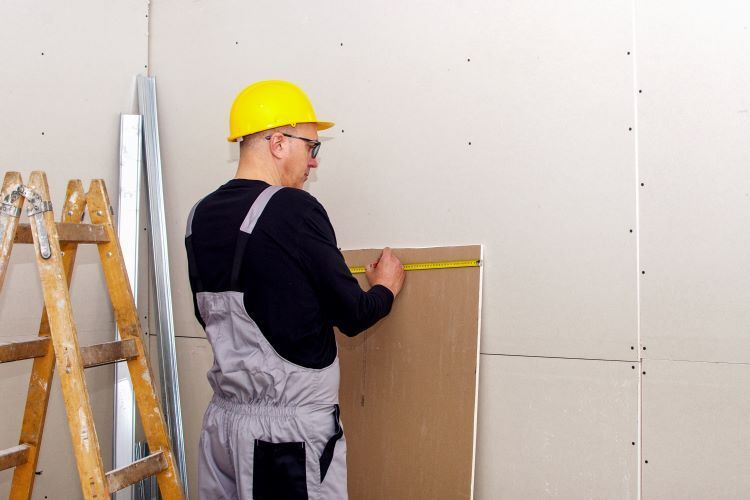Types of Drywall Used in Commercial Buildings

When it comes to constructing or renovating commercial buildings, selecting the right type of drywall is crucial. The drywall used in these projects must meet specific safety standards, offer durability, and provide the necessary fire resistance, soundproofing, and moisture resistance required for commercial spaces. At Saskatoon Drywallers, we understand the importance of choosing the appropriate drywall for different commercial applications. In this article, we'll explore the various types of drywall used in commercial buildings and how to select the best option for your project.
1. Standard Drywall
Standard drywall, also known as regular drywall or whiteboard, is the most commonly used type of drywall in commercial construction. It's composed of a gypsum core encased in a paper facing, making it lightweight and easy to install.
Applications:
- Office Spaces: Ideal for interior walls and ceilings where fire resistance and moisture protection are not primary concerns.
- Retail Stores: Suitable for creating partitions, storage areas, and display walls.
Benefits:
- Cost-Effective: Standard drywall is one of the most affordable options available, making it a popular choice for large commercial projects.
- Ease of Installation: Its lightweight nature makes it easy to handle and install, reducing labor costs and time.
2. Fire-Resistant Drywall
Fire-resistant drywall, commonly referred to as Type X or Type C drywall, is designed to slow the spread of fire, providing critical time for evacuation and firefighting efforts. This type of drywall contains non-combustible fibers and additives that enhance its fire-resistance properties.
Applications:
- Fire-Rated Walls and Ceilings: Essential in areas that require fire-rated partitions, such as stairwells, corridors, and between tenant spaces.
- Kitchens and Mechanical Rooms: Used in areas where there is a higher risk of fire, such as commercial kitchens and rooms housing mechanical equipment.
Benefits:
- Increased Safety: Provides additional time for occupants to evacuate and for emergency services to respond in the event of a fire.
- Code Compliance: Meets building code requirements for fire resistance, which is critical for commercial buildings.
3. Moisture-Resistant Drywall
Moisture-resistant drywall, often called green board or blue board due to its colored paper facing, is specifically designed to resist moisture and humidity. It has a core treated with a water-repellent substance and a moisture-resistant paper facing, making it suitable for areas prone to dampness.
Applications:
- Restrooms and Locker Rooms: Ideal for walls and ceilings in commercial restrooms, locker rooms, and other areas with high humidity levels.
- Basements: Used in commercial basements or any below-grade spaces that are susceptible to moisture.
Benefits:
- Mold Prevention: Helps prevent the growth of mold and mildew, which can cause health issues and damage the building's structure.
- Durability: Offers greater longevity in environments where moisture is a concern, reducing the need for frequent repairs or replacements.
4. Soundproof Drywall
Soundproof drywall, also known as acoustic drywall, is designed to reduce noise transmission between rooms, making it an essential component in creating a comfortable and quiet commercial environment. It typically consists of multiple layers of gypsum and other sound-dampening materials.
Applications:
- Conference Rooms and Offices: Ideal for reducing noise between meeting rooms, offices, and other areas where privacy is important.
- Hotels and Multi-Unit Buildings: Used in walls and ceilings to minimize noise transfer between units, enhancing guest comfort.
Benefits:
- Improved Acoustics: Enhances sound quality within rooms by reducing echo and noise transmission.
- Privacy: Provides a quieter, more private environment for employees, clients, and customers.
5. Impact-Resistant Drywall
Impact-resistant drywall is reinforced with additional fibers or mesh to withstand the rigors of high-traffic areas. This type of drywall is designed to resist dents, scratches, and punctures, making it ideal for areas subject to heavy use.
Applications:
- Schools and Hospitals: Ideal for corridors, classrooms, and patient rooms where walls are likely to be bumped or struck.
- Warehouses and Industrial Spaces: Used in commercial or industrial environments where walls may be exposed to equipment, machinery, or frequent contact.
Benefits:
- Durability: Offers enhanced resistance to damage, reducing the need for repairs and maintaining the building's appearance over time.
- Cost-Effective: While slightly more expensive than standard drywall, its durability can lead to long-term savings by reducing maintenance costs.
6. Mold-Resistant Drywall
Mold-resistant drywall is similar to moisture-resistant drywall but with added protection against mold and mildew. It is treated with special compounds that inhibit mold growth, making it suitable for areas with high moisture levels.
Applications:
- Health Care Facilities: Used in hospitals, clinics, and laboratories where mold prevention is critical to maintaining a sanitary environment.
- Commercial Kitchens: Ideal for areas where food preparation occurs, reducing the risk of mold contamination.
Benefits:
- Enhanced Health and Safety: Reduces the potential for mold-related health issues, ensuring a safer environment for occupants.
- Longevity: Provides long-lasting protection against mold and mildew, extending the life of the drywall in moisture-prone areas.
7. Vapor-Barrier Drywall
Vapor-barrier drywall is designed to prevent moisture from passing through walls, making it suitable for areas where moisture control is essential. It typically includes a plastic or foil backing that acts as a barrier against water vapor.
Applications:
- Cold Storage Rooms: Used in commercial refrigeration areas where temperature and humidity levels need to be tightly controlled.
- Exterior Walls: Suitable for exterior walls in cold climates to prevent condensation and moisture buildup.
Benefits:
- Moisture Control: Helps maintain the integrity of the building's structure by preventing moisture from penetrating the walls.
- Energy Efficiency: Contributes to better insulation and energy efficiency by controlling the flow of moisture and air.
Choosing the Right Drywall for Your Commercial Project
Selecting the right type of drywall for your commercial building is essential to ensuring its safety, durability, and functionality. Each type of drywall offers unique benefits that cater to specific needs, whether it's fire resistance, moisture protection, soundproofing, or impact resistance. At Saskatoon Drywallers, we have extensive experience working with all types of commercial drywall and can help you choose the best option for your project.
Whether you're constructing a new commercial building or renovating an existing space, our team is here to provide expert advice, quality materials, and professional installation. Contact us today to learn more about our commercial drywall services and how we can help you create a safe, durable, and efficient workspace.
Choosing the right drywall is a critical step in any commercial construction or renovation project. By understanding the various types of drywall available and their specific applications, you can ensure that your commercial building meets all necessary safety, durability, and performance standards.
You might also like


